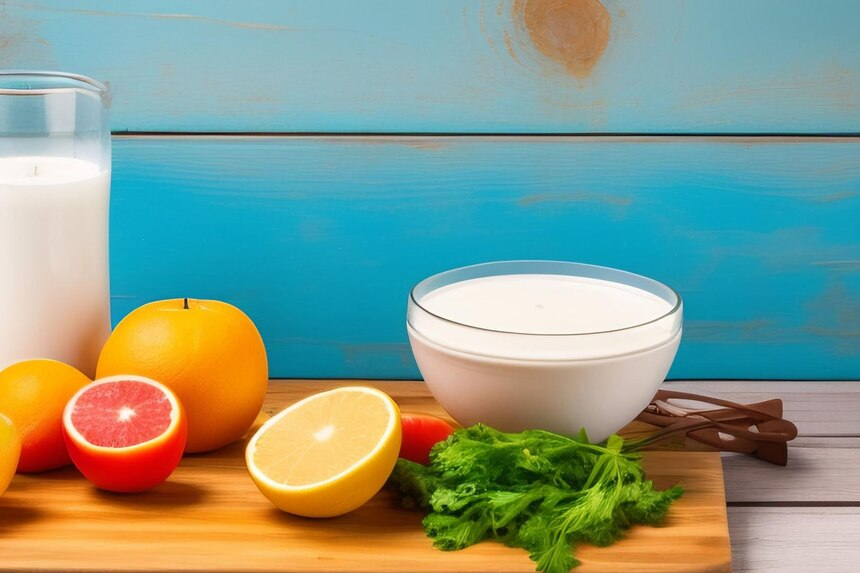A ground-breaking UK study has produced convincing data showing that colon cancer risk can be greatly lowered by increasing calcium intake, equivalent to what one glass of milk daily contains. Comprising more than half a million women over 16 years, the studies confirm that calcium has a preventive effect in lowering the incidence of this possibly fatal illness.
- From what foods might one find calcium and its protective properties?
- In what ways might calcium intake affect bowel cancer risk?
- What Are Processed Meat's and Alcohol's Risks?
- In what way may we approach lowering cancer risk holistically?
- Why is younger people's bowel cancer rising?
- Why Is a Balanced Diet Crucially Important, and What More Research Is Needed?
- Could it also be protective calcium supplements?
- Ultimately: How Can We Minish Our Bowel Cancer Risk?
From what foods might one find calcium and its protective properties?
Emphasizing the need for calcium from dairy and non-dairy sources, the study—a joint effort between Oxford University and Cancer Research UK—offers protection—dark leafy g is showing good effects on reducing colon cancer risk.
The study showed good effects on reducing colon cancer risk. It notes, “It highlights the potential protective role of dairy, largely due to calcium, in developing bowel cancer.”
Although calcium is well-known for helping to maintain good teeth and strengthen bones, its possible ability to prevent various malignancies is attracting more and more attention. However, non-dairy substitutes, including soya and rice drinks, white bread, nuts, seeds, and some fruits, such as figs and curly kale, and dairy products, including milk, yoghurt, and cheese, remain the principal sources of calcium in the UK diet.
In what ways might calcium intake affect bowel cancer risk?
According to the study, consuming 600 mg of calcium daily—the equivalent of a big glass of milk—may lower colon cancer risk by 17%. The results align with a recent study that came out concluding dairy products “probably” reduce the incidence of colorectal (bowel) cancer.
Researchers observe, “An extra 300mg of calcium a day in the diet, or a large glass of milk, lowers your risk by 17%..” They propose that since calcium binds to bile acids and free fatty acids in the colon, their possibly carcinogenic effects are reduced.
What Are Processed Meat's and Alcohol's Risks?
Apart from stressing the advantages of calcium, the research clarifies the hazards related to other dietary elements. As expected, the study confirmed that a higher risk of colon cancer is associated with too high consumption of processed meats and alcohol.
According to the study, daily drinking an extra big glass of wine or 0.7oz (20g) of alcohol increases the risk by 15%. Eating only one ounce of red and processed meat, say a slice of ham, daily raises the risk by eight per cent. These results indicate the substantial link between alcohol, processed meats, and a higher risk of colorectal cancer, so supporting earlier studies.
In what way may we approach lowering cancer risk holistically?
While some foods may affect bowel cancer risk, cancer organizations stress that the greatest strategies to reduce the chance of acquiring the disease are following a good, balanced diet, keeping a reasonable weight, and avoiding smoking.
While drinking roughly half a pint of cows’ milk a day is probably beneficial, “drinking above the safe limits of alcohol intake (more than 14 units per week) increases [the] risk of colorectal cancer in women.”
Why is younger people's bowel cancer rising?
With about 44,000 new cases reported yearly, bowel cancer is among the most often occurring malignancies in the United Kingdom. Although most occurrences involve adults over 50, concerning patterns reveal an increase in the number of younger people under 50 diagnosed with the condition. Though the exact causes of this increase are unknown, professionals cite obesity and bad diet as possible influences.
Changes in bowel habits, such as more frequent or looser stools, constipation, blood in the stool, inexplicable weight loss, and tiredness, can all be symptoms of bowel cancer. Doctors counsel, “If you notice any one of these symptoms, it’s important to speak to your doctor.”
Why Is a Balanced Diet Crucially Important, and What More Research Is Needed?
The scope of the study offers important information even if it is observational and cannot establish that calcium or any particular diet either directly prevents or causes cancer. Since it is the biggest study on colon cancer and nutrition done thus far, it gives the researchers faith in their results. Throughout the study, more than 12,000 women acquired colon cancer; around 100 food products and nutrients were investigated for possible relationships to the disease.
One expert confirms, “This paper provides important evidence showing that overall diet can influence the risk of colorectal cancer.”
Could it also be protective calcium supplements?
While foods high in calcium could have preventive properties, other professionals question whether calcium pills would have the same impact. Though the study findings beg interesting questions, researchers observe, “The jury is out on whether calcium supplements might be protective.”
List the non-dairy calcium sources and their advantages.
Furthermore comforting is the knowledge that non-dairy choices nonetheless provide calcium for people who avoid dairy products. Experts advise, “There are other ways you can get calcium, for example from broccoli or tofu, and still reduce your bowel cancer risk if you do not drink dairy milk.”
Ultimately: How Can We Minish Our Bowel Cancer Risk?
The results of this study highlight the need to keep alcohol and processed meats to a minimum and maintain a balanced diet high in calcium. Changing their way of life will help people greatly lower their risk of colon cancer. This study provides an insightful analysis of the possible function of diet in cancer prevention, even if more investigation is required to grasp the effects of calcium and other nutrients completely.








